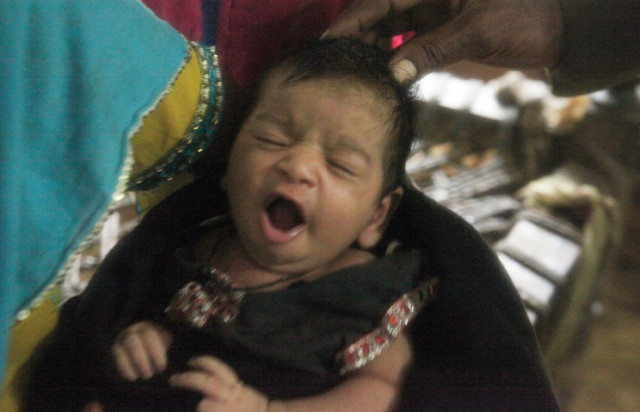Soaked to the bone: Meet Benazir, named after a hero, born in a disaster
For the people of Badin, a dry change of clothes would be a blessing.

Born in one of the few dry rooms of a camp around the day the rains first began, the newborn was named Benazir, after the area’s heroine and the abandoned school-cum-relief camp that is her home.
Benazir is now a week old, a week during which her family lost everything in the relentless downpour that has yet to let up. She lives with a group of people from her community desperately trying to sustain their lives and that of her weak, starved mother, Roshna. Though she appears healthy and spends most of her time asleep, the newborn and her mother have not received any medical care.
Maqsood, her father, strokes the soft downy fuzz on Benazir’s head. She peers at her visitor curiously and flashes a crooked gummy smile before returning to her slumber.
Though desperate for medical attention for his wife, her father shows his second child to anyone he can find. “I want people to see how she was born, and how she survives on her mother’s milk.”
As she sleeps, a storm raging outside, she does not know that the people around her count every day that she survives as a miracle. Benazir does not have a birthday because her family cannot remember what day she was born. For them, the past week has been an amalgam of never-ending rain and help feels completely elusive.
When the rain stops, the silence is overwhelming.
Here, the lives of cattle is second only to that of the people - each death of an animal is mourned with tears. The goats, sheep and buffalo used to be bred like pets, grazing in backyards and spoiled by the children. Now, they squelch through the mud trying to get at the elusive crops floating underwater. Dead livestock litter the roads and the putrid stink of the people’s decaying livelihood fills the streets.
Khoski is one of the closest towns to Badin district and hence, one of the first receivers of aid. As one travels on towards the coast, relief efforts thin and water levels rise visibly.
The majority of homes are mud huts and have been washed away. The walls of the few structures still standing are soaked through and caked with fungi with mushrooms sprouting from the dank bricks.
There is only one boat in the area and those who can travel through this newly formed lake on it. The rest just swim or wade through about four feet of water and a foot of mud. Bobbing across what was once the area’s claim to fame, locals can see their drowned rice crops swirling eerily just below the surface, buffeting the belly of the boat.
Water-bred dragonflies swarm the area while much more macabre insects crawl into huts and beds in search of dry land. The villagers are always wary of the ‘khatarnak kaala saanp’ (dangerous black snake) that they are forced to share their makeshift homes with.
The moisture is suffocating.
Rainwater flows into the bloated streams and saline drains and it soaks the air, there is not a single dry pair of clothes in the town. It slows down for a few hours but rarely stops, and a single shower lasts up to five hours at a time. A saltwater canal has burst and the locals are fishing in the ‘nehr’ that now flows right outside their doorsteps. Given that the majority of the fish from rivers are freshwater, most of them are dying in the saline water. With their usual pastimes of harvesting, sowing and tending the crops and cattle gone, young men and children past the endless hours with fishing in raincoats made of plastic garbage bags.
The roads are long islands coiling through the water and crumbling at the sides. The tents that line this rare bit of dry land are very obviously makeshift - cloth pitched on branches. The shelters are a poor defence against the cruel rain that leads to the water engulfing the roads as well.
In the urban areas, the markets are filled with mud and even the cement homes are waterlogged. Electricity is a forgotten luxury, and in many areas, even the electricity pylons have been swept away.
Residents have blocked the entrance into the town in anger and medical help is only beginning to trickle through. “We will break the windows of the police station,” they threaten in desperation. Even in this time of devastation, the people’s unyielding support for the government stands. Everywhere the faces of Benazir Bhutto and the area’s elected representative, Zulfiqar Mirza, are plastered on boards.
With writing by Husna Anwar
Published in The Express Tribune, September 10th, 2011.



















COMMENTS
Comments are moderated and generally will be posted if they are on-topic and not abusive.
For more information, please see our Comments FAQ